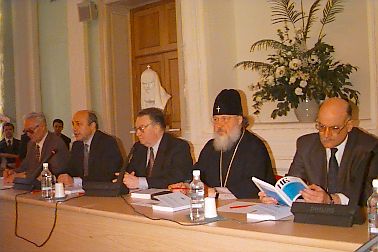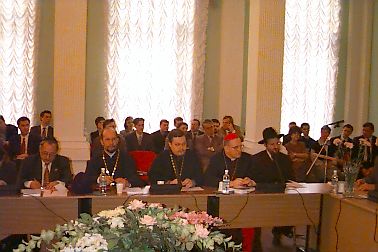Metropolitan Kirill makes the key-report at a Conference on Religion and Diplomacy
8.05.2001 · English, Архив 2001
METROPOLITAN KIRILL MAKES THE KEY-REPORT AT A CONFERENCE ON RELIGION AND DIPLOMACY
A Conference on Religion and Diplomacy took place on April 27 at the assembly hall of the Diplomatic Academy of the Russian Ministry for Foreign Affairs. It was organized by the Department for External Church Relations of the Moscow Patriarchate, the Ministry of Foreign Affairs, the Diplomatic Academy and the Moscow Institute for International Relations.
Opening the conference, Foreign Minister I. Ivanov noted the exceptional relevance of the problems to be discussed at the forum. He said in particular, “for the peoples of our multinational country, the revival of faith is part of the manifold process of social transformation. The inter-state relations need spiritual and moral principles as well… In recent years, political extremists in various parts of the world have increasingly sought to use the religious factor for enkindling inter-ethnic and inter-state enmity. It is equally amoral to destroy Orthodox churches in Kosovo, to blow up Buddhist monuments of Afghanistan and to bomb mosques in Iraq”.
Mr. Ivanov noted with satisfaction that the Ministry of Foreign Affairs maintained fruitful cooperation with the Russian Orthodox Church and traditional confessions in Russia in the efforts to revive the Fatherland and to build a safe, democratic and multipolar world based on respect for the rights to the cultural and religious identity for all nations.
His Eminence Metropolitan Kirill of Smolensk and Kaliningrad, chairman of the Department for External Church Relations of the Moscow Patriarchate, read out a Message from His Holiness Patriarch Alexy II of Moscow and All Russia. The participants in the conference were also greeted by the Diplomatic Academy Rector Yu. Fokin and the Institute of Foreign Relations Rector A. Torkunov.
During the first plenary session, Metropolitan Kirill made the key-report on Cooperation Between the Russian Orthodox Church and the Russian Diplomacy: the Past, Present and Future. After an analysis of the cooperation between the Orthodox Church and Russian diplomacy, he noted a special role that the Ministry of Foreign Affairs played in overcoming the alienation between church and state which existed in the Soviet Union and in preparing a radical review of the whole complex of church-state and church-society relations. He thanked the diplomats who, at the time of ideological dictate in all spheres of life, showed wisdom and far-sightedness by entering into dialogue with the Church for the benefit of our Fatherland.
Among the most important areas of cooperation between the Church and the Foreign Ministry today, Metropolitan Kirill singled out the restoration of historical justice towards the Russian property of religious organizations and the protection of the rights of compatriots abroad. “The world public shows utter sensitivity with regard to the real and imaginary facts of religious rights violations, especially the rights of minorities, when Russia is discussed. However, it sometimes displays absolute insensitivity in situations where the religious rights of Orthodox Russians are violated in the far and near abroad. We are convinced that there should be no place for double standard in assessing the state of human rights and religious freedoms. Nevertheless, a few days ago, the Estonian Government refused again to register the Estonian Orthodox Church of the Moscow Patriarchate. The problem of discrimination on the ground of faith against people who belong to our Church exists also in Ukraine. This is true especially for the western parts of the country where the Greek Catholics and nationalists have seized Orthodox churches by force. We are grateful to the Foreign Ministry for its readiness to hold continuous consultations with the Orthodox Church on all these problems”, Metropolitan Kirill stated.
Presentations and reports were also made by A. Chistyakov, director of the Foreign Ministry’s Middle East and Northern Africa Department, on Church and State: Russia’s Policy in the Eastern Question; Prof. K. Dolgov, Diplomatic Academy, on Religion, Power, Policy and Diplomacy; Prof. V. Glagolev, IFR, on Axiomatic Aspects of Interaction Between Religion and Diplomacy; Prof. N. Lisovoy on Spiritual Basis of Policy: Russia in the post-Byzantine Space; Archpriest Nikolay Balashov, DECR acting secretary for inter-Orthodox relations and the Russian Orthodox Church institutions abroad, on Three World Religions and the Fate of Yugoslavia; Prof. V. Dontsov, Diplomatic Academy, on Islam and Diplomacy, and others.
Among the participants were Archimandrite Mark Golovkov, DECR vice-chairman, Archpriest Vsevolod Chaplin, DECR secretary for church-society relations, other representatives of the Russian Orthodox Church, as well as diplomats, politologists, researchers, and teachers and students of the Diplomatic Academy, Institute for Foreign Relations, and Moscow State University.
On April 28, the conference will work in sections on “Russian Orthodox Church and Russian Diplomacy: Problems of Cooperation”, “Religion and Diplomacy Today”, and “Eastern Christian Civilization in Today’s World”, and hold the final plenary session.
See also:


